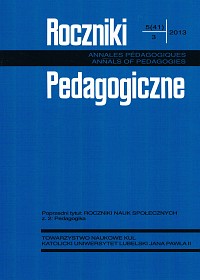Mothers' and Fathers' Depression and Child's Deafness. The Importance of Marital Satisfaction as a Predictor of Intensity of Depression Symptoms Experienced by Parents
Main Article Content
Abstract
Experiencing depression symptoms (depression) is an important problem concerning parents of handicapped children, including also parents of deaf and hard of hearing children. Studies show that these symptoms are more intensive in mothers of small children than in fathers, and also in mothers of hearing, typically developing children.
The present study poses the question if there are differences of intensity of depression symptoms experienced by mothers and fathers of deaf children aged between 3 months and 15years as compared to parents of hearing children. The study takes into consideration the relation between the intensity of depression symptoms and the time elapsed from the child's diagnosis of deafness. The question posed was whether socio-demographic variables, such as: sex, age, education, parent's marital status and marital satisfaction, as well as variables related to the child's deafness that is: the child's age at the moment of diagnosis of deafness, the time elapsed from that moment, the degree of hearing loss, the type of prosthesis used (conventional hearing aid versus cochlear implant) and satisfaction with rehabilitation may be predictors of the intensity of depression symptoms experienced by parents.
The study included 185 mothers and 55 fathers and parents of hearing children as a control group. The intensity of depression symptoms was measured using the D Scale of GHQ-28 questionnaire.
The results indicate that mothers of deaf children experience significantly more intensive depression symptoms compared to mothers of hearing, typically developing children. Depression symptoms are most intense in the first, second and seventh year from the diagnosis of deafness. In fathers no relationship between time elapsed from the diagnosis of deafness and intensity of depression symptoms was found. An important predictor of the intensity of depression symptoms in parents of deaf children and in parents of typically developing children was found to be the marital satisfaction, and not the socio-demographic variables including marital status. A higher intensity of depression symptoms in fathers of deaf children may be predicted only when the child at the moment of diagnosis of deafness is older.
Constant availability of various forms of psychological intervention and psychotherapy, including marital psychotherapy, in the offer of centers responsible for rehabilitation and education of children is crucial for parents of deaf children, because their mental functioning as parents (depression) is in strong relation with their marital satisfaction.
Article Details
References
Domańska K. (1996): Głuchota dziecka a depresja matki, nieopublikowana praca magisterska, Warszawa, Uniwersytet Warszawski, Wydział Psychologii.
Goldberg D., Williams P. (2001): Podręcznik dla użytkowników Kwestionariusza Ogólnego Stanu Zdrowia, tłum. D. Merecz. W: Ocena zdrowia psychicznego na podstawie badań kwestionariuszami Davida Goldberga, część I. Łódź: Oficyna Wydawnicza IMP.
Jackson C.W., Wegner J.R., Turnbull A.P. (2010): Family quality of life following early identification of deafness. „Language, Speech, and Hearing Services in Schools” 41, s. 194-205.
Kobosko J. (2009): Relacja matka–dziecko a zaburzenia rozwoju językowego u młodzieży głuchej. „Przegląd Psychologiczny” 52(3), s. 327-342.
Kobosko J. (2011): Pomoc psychologiczna słyszącym rodzicom a efektywność rehabilitacji dziecka głuchego. „Otorynolaryngologia” – przegląd kliniczny 10(1), s.8-14.
Kobosko J., Geremek-Samsonowicz A., SkarżyńskiH. (2014): Problemy zdrowia psychicznego matek i ojców dzieci głuchych z implantem ślimakowym. „Otolaryngologia Polska” 68(3), s. 135-142.
Kobosko J., Kosmalowa J. (2000): Depression and the implanted child family. W: V European Symposium on Pediatric Cochlear Implantation. Abstract Book. Amsterdam.
Kurtzer-White E., Luterman D. (2003): Families and children with hearing loss. Grief and coping. „Mental Retardation and Developmental Disabilities Research Reviews” 9, s. 232-235.
Kushalnagar P., Mehta P., Krull K., Caudle S., HannayJ., Oghalai J. (2007): Intelligence, parental depression, and behavior adaptability in deaf children being considered for cochlear implantation. „Journal of Deaf Studies and Deaf Education” 12, s. 335-349.
Makowska Z., Merecz D. (2001): Polska adaptacja Kwestionariuszy Ogólnego Stanu Zdrowia Davida Goldberga GHQ-12 i GHQ-28. W: Ocena zdrowia psychicznego na podstawie badań kwestionariuszami Davida Goldberga. Część II. Łódź: Oficyna Wydawnicza IMP.
Meadow-Orlans K.P. (1995): Sources of stress for mothers and fathers of deaf and hard of hearing children. „American Annals of the Deaf” 140, s. 352-357.
Rola J. (2004): Melancholia rodzinna. Psychologiczne uwarunkowania zaburzeń depresyjnych dzieci z niepełnosprawnością intelektualną. Warszawa: Wydawnictwo APS.
Seligman M.E.P., Walker E.F., Rosenhan D.L. (2003): Psychopatologia, tłum. J. Gilewicz, A. Wojciechowski. Warszawa: Zysk i S-ka Wydawnictwo.
Walewska K., Pawlik J. (red.) (1992): Depresja. Ujęcie psychoanalityczne. Warszawa: PWN.
Zaczyńska M. (1999): Tożsamość ojcowska ojców dzieci głuchych, nieopublikowana praca magisterska. Warszawa: Uniwersytet Warszawski, Wydział Psychologii.
Zaczyńska M. (2001): Być ojcem dziecka głuchego. W: J. Kobosko (red.), Bliżej życia. Materiały dla rodziców dzieci i młodzieży z wadą słuchu (s. 30-32). Warszawa: Stowarzyszenie Przyjaciół Osób Niesłyszących i Niedosłyszących „Człowiek – Człowiekowi”.
Zalewska M. (1998a): Dziecko w autoportrecie z zamalowaną twarzą. Psychiczne mechanizmy zaburzeń rozwoju tożsamości dziecka głuchego i dziecka zopóźnionym rozwojem mowy. Warszawa: J. Santorski i CO Wydawnictwo.
Zalewska M. (1998b): Psychologiczne aspekty stwierdzenia głuchoty udziecka. W: J. Rola (red.), Wybrane problemy psychologicznej diagnozy zaburzeń rozwoju dzieci (s. 177-186). Warszawa: Wydawnictwo WSPS.
Zalewska M. (1999): Trudne macierzyństwo. W: D. Kornas-Biela (red.), Oblicza macierzyństwa (s. 297-302). Lublin: Wydawnictwo KUL.
Zalewska M. (2000): Pomoc psychologiczna słyszącym rodzicom dziecka głuchego. W: H. Siedlecka, E. Kulczycka (red.), Współczesne kierunki wczesnej diagnozy i wczesnej rewalidacji dziecka z wadą słuchu (s. 33-36). Warszawa: Wydawnictwo APS.
